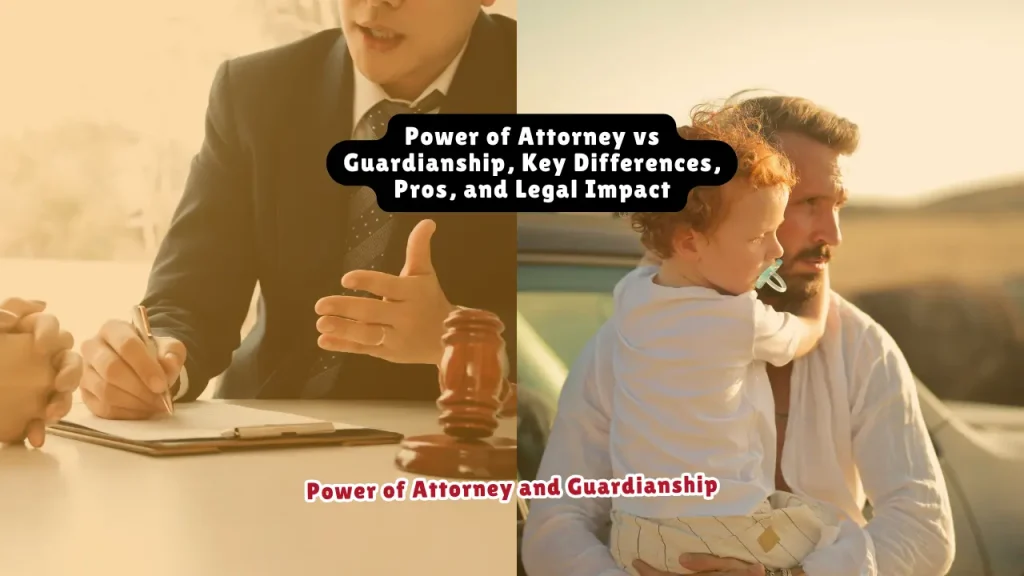Power of Attorney vs Guardianship, Key Differences, Pros, and Legal Impact
A Power of Attorney (POA) is a voluntary legal tool that lets you choose someone to manage your affairs while you’re alive. Guardianship (or conservatorship) is a court-ordered role where a judge appoints someone to make decisions for you if you’re deemed mentally incapacitated and lack a POA. The key difference? A POA is proactive and avoids court; guardianship is reactive and requires court oversight.
Table of Contents
Definitions: How They Work
1. Power of Attorney (POA)
- Voluntary: Created by a mentally competent person (the principal) to appoint an agent (or attorney-in-fact).
- Flexible: Can cover finances, healthcare, or specific tasks (e.g., selling a home).
- Control: The principal sets the terms and can revoke it anytime.
Example: A 65-year-old signs a POA allowing her daughter to manage her bills if she develops Alzheimer’s.
2. Guardianship
- Court-Ordered: A judge appoints a guardian for someone incapacitated (the ward) who can’t make decisions.
- Public Process: Requires hearings, medical evaluations, and ongoing court supervision.
- Limited Control: The ward loses most decision-making rights.
Example: A court appoints a nephew as guardian for his uncle with severe dementia after the uncle wanders into traffic.
Key Differences: Power of Attorney vs. Guardianship
| Factor | Power of Attorney | Guardianship |
| How It Starts | Created by the principal voluntarily. | Court-ordered after incapacity is proven. |
| Cost | Low (0–0–200 for forms). | High (2,000–2,000–5,000+ in legal fees). |
| Timing | Proactive (before incapacity). | Reactive (after incapacity occurs). |
| Privacy | Private document. | Public court records. |
| Authority Scope | Customizable (e.g., finances only). | Broad (covers all aspects of the ward’s life). |
| Termination | Principal can revoke anytime. | Ends only by court order or the ward’s death. |
Related content:
How to Get Power of Attorney for an Elderly Parent in New York

When to Use a Power of Attorney
A POA is ideal if:
- You want to avoid court and retain control over who manages your affairs.
- You’re planning for future incapacity (e.g., dementia diagnosis).
- You need someone to handle specific tasks, like selling property or managing investments.
Types of POA:
- Durable POA: Stays valid if you become incapacitated.
- Springing POA: Activates only under certain conditions (e.g., doctor-confirmed incapacity).
- Healthcare POA: Focuses on medical decisions.
When Guardianship Is Necessary
Guardianship is a last resort if:
- The person lacks a POA and can’t manage their own affairs.
- There’s suspected abuse by a POA agent, requiring court intervention.
- The person is a minor with no legal parent/guardian.
Real-Life Case:
In Guardianship of Smith (Texas, 2022), a son petitioned for guardianship of his father, who had a stroke and no POA. The court granted guardianship but required annual reports on the father’s care and finances.
Pros and Cons
Power of Attorney
Pros:
- Fast, affordable, and private.
- Lets you choose your decision-maker.
Cons: - Risk of abuse if the agent is untrustworthy.
- Institutions may question its validity.
Guardianship
Pros:
- Court oversight reduces exploitation risk.
- Resolves disputes among family members.
Cons: - Expensive, time-consuming, and stressful.
- The ward loses autonomy and privacy.
Quote from a Legal Expert:
“Guardianship strips away rights. A POA is always better if you plan ahead—it’s cheaper and kinder.”
— Laura Evans, Elder Law Attorney (Cited in AARP, 2023).
How to Avoid Guardianship
- Create a Durable POA while you’re healthy.
- Update Documents Regularly to reflect life changes (e.g., divorce).
- Add Safeguards like requiring your agent to report to a third party.
Resources:
- National Guardianship Association: Standards of Practice
- American Bar Association: POA State-Specific Forms
How Guardianship Works: Step-by-Step
- File a Petition: A family member, doctor, or social worker petitions the court.
- Medical Evaluation: The alleged incapacitated person is assessed by doctors.
- Court Hearing: A judge reviews evidence and appoints a guardian.
- Ongoing Oversight: The guardian submits annual reports to the court.
Key Takeaways
- POA: Proactive, private, and controlled by you.
- Guardianship: Reactive, public, and controlled by the court.
- Plan Ahead: A POA prevents guardianship, saving time, money, and dignity.
Bottom Line: A POA puts you in charge of your future. Guardianship is a safety net for those who didn’t plan. Consult an estate attorney to choose wisely.
Checklist for Decision-Making
- Create a durable POA for finances and healthcare.
- Discuss your wishes with family and agents.
- Store documents with your lawyer or a trusted contact.
- Review/update every 3–5 years.
About the Author

Sarah Klein, JD, is an experienced estate planning attorney who has helped clients with wills, trusts, powers of attorney, and probate matters. At All About Lawyer, she simplifies complex estate laws so families can protect their assets, plan ahead, and avoid legal headaches during life’s most sensitive moments.
Read more about Sarah
